'Take extra care with your compost heap in a heatwave to prevent fires,' warn experts
Fires starting in compost heaps and bins are under investigation as the cause of a number of wildfires erupting, so stay vigilant and take safety steps
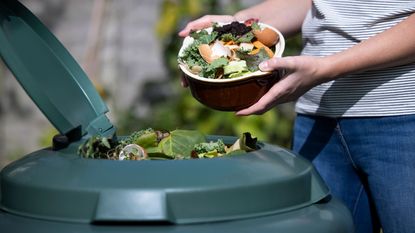

Devastating wildfires destroying homes and gardens during this summer’s UK heatwaves could be started by compost heaps and compost bins spontaneously combusting due to extreme temperatures.
Composting is a popular task for many gardeners, offering a simple way to get rid of garden waste and create free fertilizer for plants, but in extreme temperatures these piles of organic waste can pose a fire risk.
'Compost heaps rely on warmth to start breaking down plant material into rich soil. Should the piles of organic material become too hot, a compost heap can start to smoulder and even combust,' says Samantha Richards, garden gazebo expert at Gazeboshop. 'But there are measures you can take to reduce the risk of combustion.'
Keep the compost moist
Tinderbox dry conditions are a huge factor in compost piles and bins self-igniting, so the best thing to do is keep your compost moist, says Morris Hankinson, director of Hopes Grove Nurseries:
'The issue is that a dry heap will not break down, and this just poses a fire risk. So make sure that the compost bin is always moist. Although there is a hosepipe ban in many UK areas, it’s fine to use greywater, bathwater would be ideal.' Or if you've been collecting rainwater in a water butt or rain barrel, you could use this.
Or you could even add urine, says organic market gardener Mikk Murray. 'It’s a great compost activator and will help, but what also works is adding a little water as you add dry layers.'
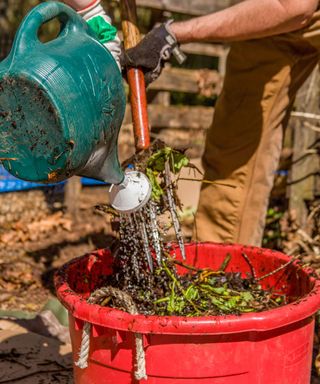
Ensure airflow
If you have a compost heap or bin at home, remember to keep turning or stirring the mulch to ensure that the organic materials are being aerated. Without sufficient air flow, things could overheat – and that’s when there’s a danger of ignition.
Always allow airflow into the centre to let the microbes do their work, breaking down the matter.
'Although you don’t necessarily need to drill holes in the side of your compost bin, ensuring there is sufficient airflow within your compost heap is essential,' says Samantha Richards.
'The best way to facilitate this is through the addition of scrunched up paper and cardboard, or twigs and prunings. Adding this to your compost stops the materials becoming too compact and restricting airflow.'
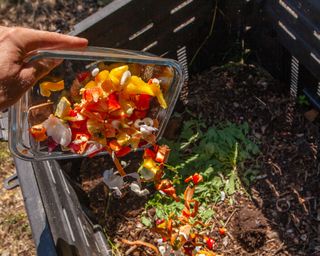
Cover and keep under control
'Keep your compost under cover to keep the sun out and the moisture in,' says Mikk Murray. This is especially important if you have a compost pile, rather than a bin.
And tempting though it is to responsibly recycle endless summer grass clippings after mowing the lawn, along with pruned branches, don’t pile your compost too high.
'A huge pile will restrict air flow and dramatically increase the risk of fire,' says Rebecca. 'The compost in your bin or heap should not exceed 12 feet high and if it does you should get rid of some of the excess waste you have.'
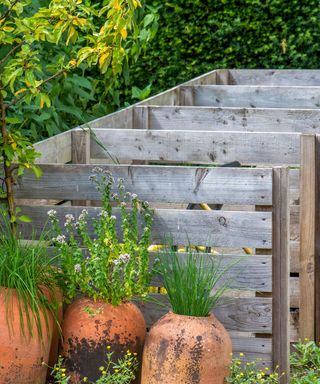
Never tackle a compost fire yourself
In the event that your compost bin or heap does catch fire, the official advice from the emergency services is to call for help, and don’t attempt to extinguish the fire.
A London Fire Brigade spokesperson says: 'As with any fire, our advice if a fire breaks out in a compost bin is to immediately call 999 [911 in the US].'
'Move a safe distance away and don’t try and tackle the fire yourself - leave it to the professionals.'

Jayne Dowle is an award-winning gardening, homes and property writer who writes for publications including Sunday Times Home, Times Bricks & Mortar, Grand Designs, House Beautiful and The Spectator. She was awarded the Garden Journalist of the Year accolade at the Property Press Awards in 2021.
-
 Do you need to chit potatoes? Find out what the experts say
Do you need to chit potatoes? Find out what the experts sayGrow Your Own Learn how to chit potatoes before planting them in the ground and you’ll be on your way to getting an earlier and bigger harvest
By Drew Swainston Published
-
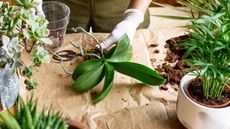 What causes orchid root rot and how do you solve it?
What causes orchid root rot and how do you solve it?Plants Discover the causes of orchid root rot so you can prevent this common problem from killing your plant
By Sarah Forsyth Published
